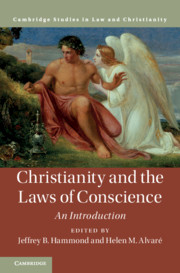Book contents
- Christianity and the Laws of Conscience
- Law and Christianity
- Christianity and the Laws of Conscience
- Copyright page
- Dedication
- Contents
- Contributors
- Acknowledgments
- Introduction
- Part I Themes in Understandings of Conscience in Christianity
- Part II Conscience According to Major Figures and Traditions
- 5 Conscience in the Early Church Fathers
- 6 St. Thomas Aquinas on Conscience
- 7 Reforming the Conscience
- 8 Toward a Theology of a Redeemed Conscience
- 9 Pierre Bayle
- 10 Freedom of Conscience and Its Right to Constitutional Protection
- 11 Jonathan Edwards on Conscience
- 12 Obeying God Rather Than Men
- 13 Mormonism and Conscience
- 14 Culture and Conscience in the Thought of Joseph Ratzinger, Pope Benedict XVI
- Part III Applied Topics in Law and Conscience
- Index
- References
7 - Reforming the Conscience
Magisterial Reformers on the Theory and Practice of Conscience
from Part II - Conscience According to Major Figures and Traditions
Published online by Cambridge University Press: 12 June 2021
- Christianity and the Laws of Conscience
- Law and Christianity
- Christianity and the Laws of Conscience
- Copyright page
- Dedication
- Contents
- Contributors
- Acknowledgments
- Introduction
- Part I Themes in Understandings of Conscience in Christianity
- Part II Conscience According to Major Figures and Traditions
- 5 Conscience in the Early Church Fathers
- 6 St. Thomas Aquinas on Conscience
- 7 Reforming the Conscience
- 8 Toward a Theology of a Redeemed Conscience
- 9 Pierre Bayle
- 10 Freedom of Conscience and Its Right to Constitutional Protection
- 11 Jonathan Edwards on Conscience
- 12 Obeying God Rather Than Men
- 13 Mormonism and Conscience
- 14 Culture and Conscience in the Thought of Joseph Ratzinger, Pope Benedict XVI
- Part III Applied Topics in Law and Conscience
- Index
- References
Summary
John Thompson describes how Martin Luther and John Calvin treated conscience. For Luther, natural conscience is beset by knowing that a person can never meet the rigorous requirements of the law. Faith can relieve a person’s downtrodden conscience, which would otherwise condemn him. Once a person accepts the favor of God that flows solely from trusting him, his conscience is liberated. He knows he can do nothing himself to merit that favor. His conscience is freed “to trust God’s promise of mercy and forgiveness.” The highest functioning conscience for Luther, then, is the one that does not depend on its own goodness or perfection. Calvin teaches that, though a person’s conscience is a natural faculty, it is marred and affected by the fall. Once a person is saved, however, his conscience is transformed so that he desires to obey the will of God found in the law. This is true even though adherence to the law will not add in the least to his salvation. For this reason, Calvin created a catechism to train and chasten Genevan Christians’ consciences. Calvin also helped to establish the Geneva consistory, which was less a disciplinary body, and rather “a school for consciences.”
Keywords
- Type
- Chapter
- Information
- Christianity and the Laws of ConscienceAn Introduction, pp. 132 - 151Publisher: Cambridge University PressPrint publication year: 2021



